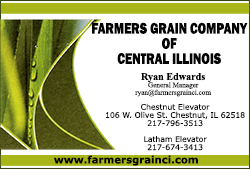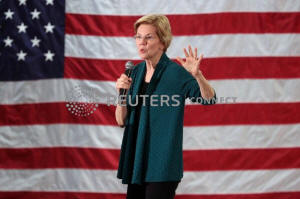|
Democrats push financial inclusion as
2020 election race heats up
 Send a link to a friend
Send a link to a friend
 [March 22, 2019]
By Pete Schroeder and Anna Irrera [March 22, 2019]
By Pete Schroeder and Anna Irrera
WASHINGTON (Reuters) - Boosting access to
the U.S. banking system is emerging as a prominent theme as Democrats
tap discontent over income inequality ahead of the 2020 presidential
election.
Following the 2008 financial crisis, many banks pulled back from their
poorest customers. The shift has had lasting costs for millions of
Americans now struggling to access mainstream financial services such as
checking accounts and credit cards.
Ten years later, Democrats, driven by progressive firebrands like
Senators Bernie Sanders, Elizabeth Warren and Representative Alexandria
Ocasio-Cortez, see financial inclusion as a draw for voters.
The three Democrats, along with Senator Kirsten Gillibrand, have
advocated for the U.S. Postal Service to provide banking services.
Senator Cory Booker has said he wants to ban overdraft fees and Senator
Kamala Harris has called for a crackdown on payday lenders.
Gillibrand, Booker, Harris, Sanders and Warren are all running for
president.
Humu Issifu, an African-American school worker from Chicago, said
overdraft debt led her to close her checking account. Issifu, who now
has a savings account, said she felt lawmakers do not care about
struggles like hers but they should.

"I think more young students, more people would vote," Issifu, 26, said.
Unlike other liberal issues such as affordable housing, gun-control and
taxing the rich, financial inclusion resonates among two key demographic
groups: minorities and the rural Americans who powered Donald Trump into
the White House, experts say.
"Candidates ... are looking for ways to raise issues that are inherently
about racial justice. They want to make sure they are mobilizing black
and Latino voters," said Maurice BP-Weeks, co-executive director of
Action Center on Race & the Economy.
"But they are also looking for things that are common themes for people
living in rural communities. Financial inclusion is one of those things
that ties together those people."
Nearly 85 million Americans, predominantly from low-income, rural and
minority backgrounds, do not have a bank account or only have access to
basic banking services, according to Federal Deposit Insurance
Corporation data compiled in 2017.
[See graphic https://tmsnrt.rs/2Ogvxwj]
Both "unbanked" and "underbanked" households spend on average 10 percent
of their annual income – as much as the average household spends on food
– to access basic services like check cashing or credit, according to a
2014 government study.
"It's expensive to be poor," Warren told Reuters in a statement. "We
need a strong Consumer Financial Protection Bureau that cracks down on
payday lenders ... And we need postal banking so people in every
community in America have easy and convenient access to basic banking
products," she added.
Beyond overdraft charges, many Americans cannot afford minimum balances,
annual fees and ATM fees associated with many bank accounts. The cost of
accessing financial services exacerbates the gap between the rich and
the poor, a source of rising anger among voters which Democrats have
seized upon.
[to top of second column]
|

Democratic 2020 U.S. presidential candidate and U.S. Senator
Elizabeth Warren (D-MA) speaks to supporters in Memphis, Tennessee,
U.S. March 17, 2019. REUTERS/Karen Pulfer Focht

DISCONNECT
"The paradox is that the economy is doing great but there is a
disconnect between households and the economy," said Ida Rademacher,
executive director of nonprofit the Aspen Institute's Financial
Security Program. "A country's financial system is a key determinant
of whether an economy is fair or just."
A 2018 Pew Research Center poll found 63 percent of U.S. adults
believe the economy is unfairly tilted toward the rich and powerful.
"Closing the wealth gap and helping underbanked Americans achieve
financial security are top priorities for Senator Gillibrand," her
campaign spokesman said.
Josh Orton, an adviser to Sanders' campaign, said Sanders had long
fought to curb payday lenders and introduce postal banking.
Representatives for Ocasio-Cortez, Booker and Harris did not respond
to requests for comment.
Progressives like Warren and Sanders have pushed financial inclusion
for years but the issue is getting more traction as progressives
gain sway in the Democratic Party, said Mehrsa Baradaran, professor
at the University of Georgia who has advised several campaigns.
Nationally, the unbanked and underbanked population has declined
since the crisis, driven mainly by wage gains spurred by economic
growth, the FDIC found. That improvement has been uneven, with the
percentage of unbanked in a dozen states growing between 2013 and
2017, and could reverse if the economy slumps.
While rural households are more likely to encounter barriers
accessing financial services, many cities have higher rates of
unbanked than the national average, the data shows.

"I could see our life was getting harder and harder because I didn't
have an account," said Dasan King, 19, a San Francisco movie-theater
worker who spent up to 5 percent of his paychecks cashing them until
he was able to open a bank account.
King said he was angry about the fees but was skeptical politicians
would address the problem.
(Reporting Pete Schroeder in Washington and Anna Irrera in New York;
writing and additional reporting by Michelle Price; editing by Neal
Templin and Bill Trott)
[© 2019 Thomson Reuters. All rights
reserved.]
Copyright 2019 Reuters. All rights reserved. This material may not be published,
broadcast, rewritten or redistributed.
Thompson Reuters is solely responsible for this content. |